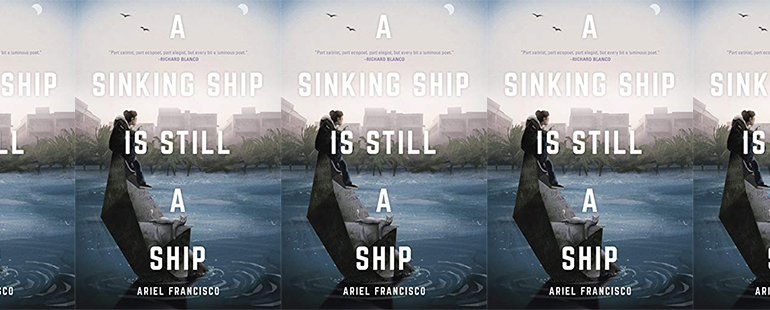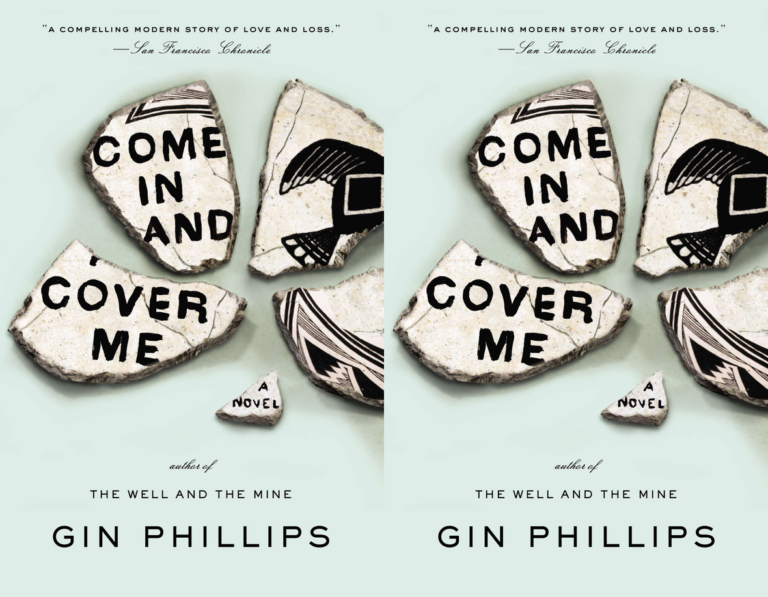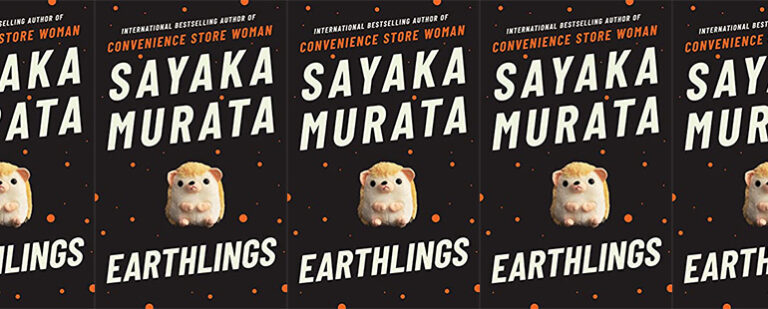“If somebody translates your poem and you consider going back to revise it, that’s a good translation.”: An Interview with Ariel Francisco

Sometimes, around sundown, westward-facing Miami high-rises appear to be on fire, the wild, combustive elements of nature reflecting off expensive, glass façades. This liminal space, where fabricated structure and setting sun meet and react, is where poet Ariel Francisco’s latest poetry collection, A Sinking Ship Is Still a Ship, takes up residence.
“On Seeing a Photo of an Octopus in a Parking Garage,” one poem from the book, is a perfect example. When Francisco writes, “Again they blame the supermoon, / the king tide marching out to war / with land, but this is new: the first / floor of this parking garage turned / into an atoll overnight and floating,” it isn’t just in content that he draws distinctions with graphite and thumb-smudges them—it’s in the lines themselves. Their endings—“But this is new: the first,” “parking garage turned,” “floating”—all create suspense. And then, exactly halfway through the poem, he turns his lens on the octopus itself, “its eight arms spread / straight out like the points of a / compass, reaching equally in every / direction for a way back home.” The body of the octopus is like the compass, everywhere and nowhere at the same time.
Another expression of liminality in the book comes from the fact that it’s presented simultaneously in English and Spanish. Francisco wrote the poems in English and with his publisher, Burrow Press, found José Nicolás Cabrera-Schneider to translate them. The English version appears on the right side of the page and the Spanish on the left. Fluidity of language is implied in translation—an idea from the poet’s mind can be continually reshaped from language to language, never stagnant. In Cabrera-Schneider’s translation of the “Octopus,” for example, the second half of the poem becomes “sus ocho brazos se extienden / rectos como pétalos de la rosa náutica.” Literally translated, these lines mean, “its eight arms extended / straight like petals of the compass rose.” The translator doesn’t just rewrite the poet’s line in Spanish, he finds a way to create an image based on his reading of the poem.
Francisco is a young poet matured in this book, leaning into the naturalist observations that were present in his second, All My Heroes Are Broke, published in 2017 (his first, Before Snowfall, After Rain, was published in 2016). He writes haiku with the precision and wisdom of a sure-handed veteran and infuses them with a trademark sardonic wit. The poem “Haiku Written at a Gas Station”—a title, by the way, reflecting the gray area where beauty and industry meet—includes the lines, “Palm trees are waving / hello or goodbye to you. / Don’t be rude—wave back.” Haiku is a form that lends itself to naturalism. Its syllabic constriction forces the poet to be clearly focused, and oftentimes the poet uses the space to focus on objects in nature. (Francisco may take some of his cues from the famous Haiku master, Matsuo Bashō. Not only does he refer to him in his verse, but his cat—the one featured on the cover of his book—is named for the poet.)
I recently spoke with Francisco about A Sinking Ship, which came out this March. We bonded over our shared experiences growing up in Miami. After graduating from Florida International University’s MFA program, he moved up to New York, seemingly to get away from our hometown traffic. When I read A Sinking Ship Is Still a Ship though, I have to admit, I read a deep animosity towards Miami and Florida in general. Only throughout our conversation did I learn that my misreading was just that of a self-conscious local. Francisco wrote an entire book of poems focused on this place, after all. His poetic jabs are layered, coming from a loving place, focused on a complicated place. It was Miami, and its community of writers centered around FIU and the O, Miami Poetry Festival held each April that molded him into the poet he’s become.
Jason Katz: Was Sinking Ship you trying to make sense of something terrible? It struck me that you feel like Florida is terrible.
Ariel Francisco: It is, but it’s hard, too, you know—it’s more than that. You can only say that if you’ve lived there for a very long time. Like, you can make fun of your little brother, but if other people do it that’s a problem.
JK: When other people come after Florida, you stand up for it?
AF: Oh, for sure. I mean, it depends you know, because people joke; it does get made fun of a lot for good reason. It really depends on the tone and what the actual approach is. There are a lot of great things about it, especially in Miami. But as much as I dislike it there’s a lot that I love about it too, for sure.
JK: What do you love about it?
AF: Not to be corny but, like, the people. I’m always trashing it, but really it’s the whole literary scene there. It’s really amazing. I don’t think I would have ever done anything with poetry if it wasn’t for Miami. The first O, Miami Festival was in 2011, I think, and then very suddenly there was all of this poetry around me. The timing was really fantastic. I got to meet [festival co-founder P.] Scott [Cunningham] and all of these incredible poets that he was bringing into the city and attend all these kinds of cool and wacky events. I got a tattoo at a poetry reading. I went to see Tom Healy and Kevin Young read at a fancy Miami Beach Hotel bar, the Freehand or the Standard or something. Miami Beach was never a place that I frequented. I grew up in Carrol City and then lived in Miami Springs for a while. It was all unexpected.
JK: You’re in New York now, though, right?
AF: Yes, and the best part for me about being up here is that I don’t have to drive. I absolutely hate driving so much, man, especially having to commute by car. Everything being connected by the subways makes me a better person. When I’m driving, I’m just like in a rage, and in a bad mood constantly.
JK: Can you talk about the influence driving had on your poetry? I can count at least ten poems set in traffic or at red lights in this book.
AF: Driving anywhere in Miami takes forever because the infrastructure is garbage and there’s always traffic, so it’s a lot of time to think. But the downside is those thoughts get kind of warped. They tend to be mostly negative thoughts because I’m in a bad mood because I can’t get to where I need to go in a reasonable amount of time. So yeah, there is a lot of driving in the book and it’s mostly sarcastic, you know what I mean? It’s mostly exaggerated anger. They’re not—at least they’re not meant to be angry poems, because that doesn’t quite accomplish anything, you know, it has to be so exaggerated that it becomes kind of funny. But yeah, a lot of these poems were either written or thought up while I was stuck on 95.
JK: I’ve heard Campbell McGrath describe writing a poem as trying to get through and around traffic. What do you think?
AF: The analogy works, but in my experience, trying to take any kind of alternate route ends up worse. You know, it’s, it’s just frustrating.
JK: Do you find that in your poetry too?
AF: It’s trying to take a different way to get to the same place, you know what I mean? Not that it doesn’t work for me ever. Sometimes I’ll take a different route and realize that the poem is actually going somewhere else, and that can be a good thing.
JK: Going back to that idea of taking a turn, in the book I noticed that there’s a tightness in your poems—a narrative thread that’s still connected at the end. Even if you send the speaker to space, the poem feels grounded. Do you ever find yourself lost incoherently in lyrics, surrealism, or metaphor?
AF: I get lost all of the time, you know, but I sometimes know where I want to land. The poem I think you’re talking about is “Eating Dinner Alone at the 163rd Street Mall.” I knew that I wanted to have the imagination go into space, but I didn’t want it to end there, so how do I metaphorically land? I’m thinking about that while I’m working on the poem. I learned how to write a three-act poem from Campbell. You start in one place, and you go somewhere, whether literally or metaphorically or kind of imaginatively, and then you have to come back—different, you know, you can’t come back to where you started, but you have to return to something changed. I definitely got lost working on that poem. I don’t try and stay lost in poems though. That bothers me. Poetry for me is a sense-making space. If I can’t end up making sense of anything, then that might not be a poem for me. I’m not sure that’s a good thing, by the way.
JK: Talk about your relationship to poetry in translation. We both took a course with Campbell on the subject.
AF: Campbell’s class was the first class I took on the subject, but my dad’s a poet. I started translating poetry around 2013. My dad is the biggest book nerd you’ll ever meet. The whole house is just covered in books, every wall. I would go through his poetry books and take whatever I wanted. He’s not going to say no. I have all these cool books but a lot of them were bilingual, so I was getting into Neruda and Lorca. And now I’m getting a second MFA in literary translation.
JK: One of the books Campbell taught was Aimé Césaire’s Notebook of a Return to the Native Land. You have a found Haiku from that book in Sinking Ship. It goes, “The only thing in / the world that’s worth beginning: / the end of the world.” Did you go looking for it or did you just recognize it?
AF: You know, there’s a James Wright found Haiku in the book also. He has a lot of prose poems. I was thinking of how to write a prose poem. What to do when you don’t have lines. Campbell talks about mixing up syntax, seeking different rhythms. I found a phrase that seemed interesting and then noticed it was a haiku. Finding haiku turned into something that I do.
JK: The Césaire haiku feels right for our current situation.
AF: Yes, it does.
JK: Talk more about the writers that you kind of choose to be in conversation with. I wonder how they come to you.
AF: I write down everything. I journal, but in the same notebooks I’ll write down notes or poems. I write down quotes that I like from what I’m reading. It works like a timeline of whatever I was reading. And some of those jump out. Some of the writers, I think, want to talk to me, you know, not to sound like crazy person. And some of them I want to be in conversation with, and try to figure out a way to do that. There’s some that I can’t figure out, I mean, there’s a lot. Sylvia Plath in particular. She was one of the first poets that I liked. I can’t quite figure out how to engage with her in the same way that I figured it out with these other poets. Sometimes it’s the line, and sometimes it’s the aesthetic. Frank O’Hara comes out a bit too. He’s the New York poet, just kind of wandering around and taking in the city. And that’s something that I love to do. So, it’s like we have that in common. So it’s a different way to engage with them as well—it’s a kind of, I’m not sure camaraderie is the right word, but we have something in common. It’s like, oh, you do this, and I also do this, maybe. Like I can have us hang out in the poem together, and their ghosts won’t be mad.
JK: You just want to smoke a cigarette with Jack Kerouac?
AF: I don’t smoke, but he’s someone that I really liked when I was younger. He has issues for sure, but he’s also someone that my dad really likes. He lived in Orlando for quite a bit. Most people don’t know he was in Orlando when On the Road blew up. He didn’t write it there, but that’s where he was. He became famous when he was in Orlando. And I feel like not enough people know that. I don’t know if he influenced me stylistically. But he was definitely an influence on me as a writer, early on. What I like most about Jack Kerouac are his letters. I like them more than his poetry and more than his novels, because the letters are really fantastic especially the ones with Ginsberg. He was obsessed with writing, and he was always thinking about the things he was working on, and it seems really sincere that his brain is just like constantly trying to figure things out, so that he gets it down into words. Even though there’s the whole myth that, you know, he just kind of wrote everything down at once. That’s not true. He was incredibly, incredibly meticulous with his process. In multiple ways he was a Florida guy, you know, Florida sort of doesn’t get enough credit. He’s got to be the biggest literary ghost in Florida.
JK: I wanted to go back to translation. In the second half of your poem, “On Seeing a Photo of an Octopus in a Parking Garage,” you compare its eight arms to the “points of the compass,” but José Nicolás Cabrera-Schneider writes the arms as, literally translated, “petals of the nautical rose.” Which version do you prefer, yours or his?
AF: It’s infinitely better in the Spanish. But that’s the cool thing about it. I told him to do whatever he needed to do to have it work in Spanish. Translation is not a word for word rendition. If that was the case, you could just plug it into Google Translate and that would be it. The human element is what makes it poetry. It has to be poetry in the other language. If somebody translates your poem and you consider going back to revise it, that’s a good translation.
JK: Is it too late to change it?
AF: Well, that’s one of the fun parts about it. The other thing is, I translate from Spanish to English, and it may sound silly to say, but Spanish is a lot more poetic to me. Sometimes I’m translating, and I feel like English is failing me. It’s cool to see it go the other way.
JK: Why do you think Spanish is more poetic?
AF: I couldn’t really tell you, I failed my linguistics class. To me, it’s just more musical and what I really value in poetry is lyricism. I don’t want to say it’s easier to be more lyrical in Spanish, but there are more possibilities.
JK: Who did you think the audience for the translation of this book is?
AF: People in Miami. My family. It was very much a Miami book. I wanted anybody there to be able to read it. It would have been awesome to see it translated into Creole also. The timeline was a little tight, though. Originally, I wanted my dad to translate it. But he didn’t quite—I mean, I’m not gonna call my dad lazy in the interview. I gave him a timeline. And then we both kind of agreed that he wouldn’t be able to do it. I’m really glad we found Nico. Sure, I’d have loved somebody in Miami to do it.
JK: If you can do it again, do you have a dream translator?
AF: Honestly, my dad is still my top pick. If only there were more time. I’m not familiar with a ton of people that are going from English to Spanish. There’s JV Portela in Miami. I actually really love his stuff. He translated the first book put out by Jai Alai Books, Suicide by Jaguar, written by an FIU alum, Dave Lansberger.
JK: Miami Spanish might be hard to translate into. It’s a sort of strange vernacular.
AF: I think I’d have to write in Miami Spanglish. There are so many different types of Spanish, in every country and region. Translation is wild, man. I love it.
JK: Going back to “On Seeing a Photo of an Octopus in a Parking Garage,” I feel like you, the poet, are the octopus.
AF: How so?
JK: It’s stuck, looking for a way back home. In a parking garage, a metaphor for Miami.
AF: That was a real photo.
JK: I feel like that photo is in the same genre as the one of the python swallowing gator. Both imply how we’ve messed with nature.
AF: Yeah, well, that genre is Florida.
JK: You have a kind of sarcasm, or even cynicism about the place. In a poem you describe it as the second worst island behind the Pacific trash heap. But in the vein of toeing the line, which moments in the book speak most to your love of Florida?
AF: There’s the Alligator poem, “Driving to Work, I Stop Suddenly to Let an Alligator Cross the Road.” That actually happened to my dad. I think there’s love there for sure of, like, not just the wildlife, but the good crazy of Florida. Being in the presence of nature in [a] really jaw-dropping kind of way.
JK: Changing direction before we finish up, because it’s something I think about often, I was wondering what you thought about this quote from Li-Young Lee: he says, “silence is to poetry as space is to architecture.”
AF: That’s fascinating. Perhaps, for me, it has something to do with the tightness you referred to earlier. I do write that way intentionally. I cannot write long lines. The closer to the margin I get, I develop a weird anxiety. I write my poems on Google Docs with a four-inch margin. So for me, it’s entirely to do with the space the poem takes up on the page, and how it relates to what I’m writing about it. The found haiku by Césaire is a good example. The subject matter is huge, but it’s a haiku.


